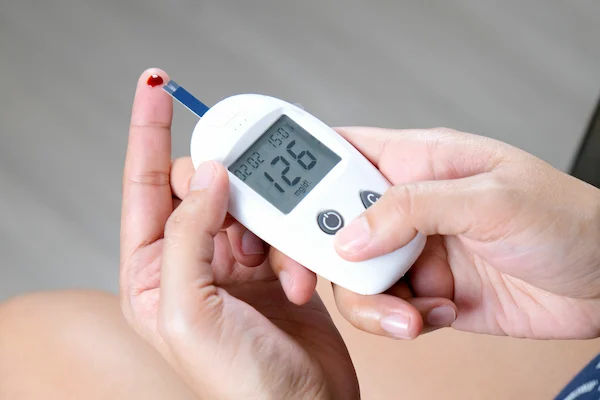The Diabetes-Heart Disease Link: Why Patients Are Prone & How to Stay Safe
Discover why diabetes increases heart disease risk and how to protect yourself. Learn the science behind the link and proven strategies to safeguard your heart health.

Written by Dr. Shaik Abdul Kalam
Reviewed by Dr. Vasanthasree Nair MBBS
Last updated on 13th Jan, 2026

Introduction
Living with diabetes involves much more than monitoring blood sugar levels. It requires a holistic understanding of how the condition affects your entire body, with the cardiovascular system being one of the most critical areas of concern. If you or a loved one has diabetes, you may have heard that there's an increased risk for heart problems. But why is that? The connection is strong, complex, and backed by extensive research. Individuals with diabetes are two to four times more likely to develop cardiovascular disease than those without diabetes. This article will demystify this vital link, exploring the biological mechanisms at play, outlining the specific heart disorders you should be aware of, and, most importantly, providing a practical action plan to significantly reduce your risk and protect your long-term health. Understanding this relationship is the first powerful step toward taking control of your well-being.
The Unbreakable Link: How Diabetes Paves the Way for Heart Trouble
At its core, the connection between high blood sugar and heart attack risk is rooted in sustained damage to your body's vascular system. Consistently high blood glucose (hyperglycemia) isn't a passive state; it's an active attacker on your arteries and veins.
The Silent Attack on Blood Vessels
Think of your blood vessels as smooth, flexible pipelines. High blood sugar acts like a corrosive agent, damaging the delicate inner lining (the endothelium) of these pipes. This damage creates small tears and makes it easier for fatty deposits, cholesterol, and other substances (plaque) to cling to the artery walls—a process known as atherosclerosis, or hardening of the arteries. As plaque builds up, the arteries narrow and harden, restricting blood flow. If a plaque ruptures, it can trigger a blood clot that completely blocks an artery, leading to a heart attack or stroke.
The Domino Effect: From Insulin Resistance to Inflammation
Type 2 diabetes is often characterised by insulin resistance, where the body's cells don't respond well to insulin. This doesn't just affect blood sugar; it triggers a cascade of problems. Insulin resistance is closely linked to:
Increased inflammation: Chronic, low-grade inflammation throughout the body damages blood vessels and promotes plaque formation.
Dyslipidaemia: An unhealthy cholesterol profile, typically featuring high levels of triglycerides, low levels of "good" HDL cholesterol, and small, dense particles of "bad" LDL cholesterol that are particularly adept at burrowing into artery walls.
High Blood Pressure: The kidneys are affected by insulin resistance and vascular damage, often leading to increased blood pressure, which further strains the heart and arteries.
This combination of factors creates a perfect storm for cardiovascular disorders in diabetic patients.
Consult an Endocrinologist or a Cardiologist for the best advice
Specific Cardiovascular Disorders Diabetes Patients Are Prone To
The damage caused by diabetes can manifest in several serious cardiovascular conditions.
Coronary Artery Disease (CAD) and Heart Attack
This is the most common form of heart disease in people with diabetes. CAD occurs when the coronary arteries, which supply blood to the heart muscle itself, become narrowed or blocked by plaque. This can cause chest pain (angina). A heart attack (myocardial infarction) happens when blood flow to a part of the heart is completely cut off, damaging the heart muscle.
Heart Failure: When the Muscle Grows Weary
Heart failure doesn't mean the heart stops beating; it means it has trouble pumping blood efficiently enough to meet the body's needs. Diabetes can lead to a condition called diabetic cardiomyopathy, where the heart muscle becomes stiff and weak independently of coronary artery disease. The heart has to work harder to pump blood through stiffened arteries, leading to fatigue, shortness of breath, and fluid buildup.
Stroke: A Brain Under Threat
A stroke occurs when blood flow to a part of the brain is interrupted. The same atherosclerotic process that affects heart arteries can affect arteries leading to the brain. A clot blocking a brain artery causes an ischemic stroke, which is the most common type. Given that diabetes patients are prone to atherosclerosis, their stroke risk is significantly elevated.
Peripheral Artery Disease (PAD): Poor Circulation in the Limbs
PAD involves the narrowing of arteries in the legs and feet, reducing blood flow. This can cause leg pain when walking (claudication), slow-healing sores, and, in severe cases, lead to infections and amputations. People with diabetes need to be exceptionally vigilant about foot care due to PAD and associated nerve damage (neuropathy).
Your Action Plan: Proactive Strategies to Protect Your Heart
The good news is that the high risk of heart disease with type 2 diabetes is not a life sentence. Aggressive management can dramatically lower your risk.
The Power of Diet: Eating for Heart and Pancreas Health
A heart-healthy diet for diabetes is rich in fibre, lean protein, and healthy fats while being low in processed sugars, refined carbs, and saturated/trans fats. Focus on:
Non-starchy vegetables: Leafy greens, broccoli, peppers.
Whole grains: Oats, quinoa, brown rice.
Lean proteins: Fish (especially fatty fish like salmon for omega-3s), skinless poultry, legumes.
Healthy fats: Avocado, nuts, seeds, olive oil.
This approach, often similar to a Mediterranean diet, helps control weight, blood sugar, and cholesterol simultaneously.
Movement as Medicine: The Role of Regular Exercise
Aim for at least 150 minutes of moderate-intensity aerobic exercise (like brisk walking, cycling, swimming) per week, spread over most days. Exercise improves insulin sensitivity, helps lower blood pressure, strengthens the heart muscle, and aids in weight management. If your condition does not improve after trying these methods, book a physical visit to a doctor with Apollo24|7 to create a safe and effective exercise plan tailored to your needs.
Medication Adherence: A Pillar of Prevention
Taking prescribed medications consistently is non-negotiable. This includes not only diabetes medications (like metformin or newer classes that have shown cardiovascular benefits) but also medications for blood pressure and cholesterol (like statins). Apollo24|7 offers convenient home collection for tests like HbA1c, lipid profile, and kidney function tests, making it easier to monitor the effectiveness of your medications and overall management plan.
Conclusion
Understanding that diabetes and heart health are two sides of the same coin is empowering. While it's true that diabetes patients are prone to cardiovascular disorders, this knowledge equips you to take decisive, proactive action. By committing to a comprehensive management plan that addresses blood sugar, blood pressure, cholesterol, and lifestyle factors, you can powerfully interrupt the destructive chain of events that leads to heart disease. You are not a passive bystander in your health journey. Partner with your healthcare providers, leverage modern tools for monitoring and consultation, and make daily choices that protect your heart. Your future self will thank you for the vigilance and care you invest today.
Consult an Endocrinologist or a Cardiologist for the best advice
Consult an Endocrinologist or a Cardiologist for the best advice

Dr Sakshi Gagneja
Endocrinologist
7 Years • DNB (Medicine – Gold Medal), DrNB (Endocrinology )
Lucknow
Apollomedics Super Speciality Hospital, Lucknow
(25+ Patients)

Dr. Richa Chaturvedi
Endocrinologist
22 Years • MBBS, MD, DM
Delhi
Apollo Hospitals Indraprastha, Delhi
(125+ Patients)

Dr. Chandar Mohan Batra
Endocrinologist
30 Years • MBBS, DCH, MD (Int. Med.), DNB (Endocrinology)
Delhi
Apollo Hospitals Indraprastha, Delhi
(125+ Patients)
Dr Kalpana Dash
Endocrinologist
30 Years • M.B.B.S. , M.D. (GENERAL MEDICINE), D.N.B. in Endocrinology , D.M ( ENDOCRINOLOGY )
Raipur
Apollo Sugar Clinics, Raipur, Raipur

Dr. Amrutha G
General Physician/ Internal Medicine Specialist
10 Years • MBBS,DNB(family medicine), Diabetologist-CCEBDM,CCGDM
Bengaluru
Apollo Clinic, Sarjapur Road, Bengaluru
More articles from Diabetes
Frequently Asked Questions
1. Why are diabetics at higher risk for heart disease even if their blood sugar is under control?
Even with good glycemic control, the underlying factors like insulin resistance and the cumulative damage from prior high blood sugar can persist. This is why managing other risk factors like blood pressure and cholesterol is equally critical, as they work together to protect your cardiovascular system.
2. What are the symptoms of heart problems in a diabetic patient?
Symptoms can be typical, like chest pain or pressure, shortness of breath, and pain radiating to the jaw or arm. However, diabetes can cause nerve damage that blunts pain sensation, leading to 'silent' heart attacks with no obvious pain. Be alert to unusual fatigue, dizziness, nausea, or cold sweats.
3. Can managing diabetes reverse heart disease?
While existing plaque may not fully disappear, aggressive management can absolutely halt its progression, stabilise it (making it less likely to rupture), and even cause some regression. More importantly, it dramatically reduces the risk of future heart attacks and strokes.
4. Is the risk of heart disease the same for Type 1 and Type 2 diabetes?
Both types significantly increase cardiovascular risk. The mechanisms are similar, primarily related to the damaging effects of high blood glucose. However, since Type 1 often starts at a younger age, the duration of exposure to risk factors can be longer, making lifelong vigilant management essential.
5. What is the best diet for someone with diabetes and heart disease?
Diets like the Mediterranean diet or the DASH (dietary approaches to stop hypertension) diet are highly recommended. They emphasise fruits, vegetables, whole grains, lean proteins, and healthy fats while minimising processed foods, red meat, and added sugars, effectively addressing both conditions.


